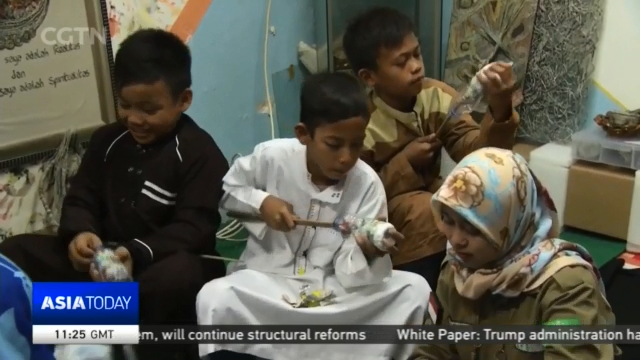
19:55, 25-Sep-2018
Indonesia Plastic Pollution: Religious organizations join fight to reduce plastic waste
Updated
19:05, 28-Sep-2018
02:45

As one of the planet's major plastic polluters, Indonesia is working to tackle its plastic problem. The government has enlisted the help of clerics from two of the country's largest Islamic organizations. The new program seeks to raise awareness on the dangers plastic waste poses to the environment. CGTN's Silkina Ahluwalia has more.
Indonesia is now turning to religion in an effort to address the country's plastic pollution problem. At this facility in Jakarta, children are listening to a sermon on the importance of caring for the environment. It's part of a program called "Sermons on Waste" initiated by two of Indonesia's largest Islamic organizations, Nahdlatul Ulama and Muhammadiyah. Together, they have a total of 100 million followers across the country.
FITRIA ARIYANI NU'S DIRECTOR OF DISASTER MANAGEMENT & CLIMATE CHANGE RISK "We have a very effective system of education through sermons here. We want to instill awareness in children that recycling doesn't mean it has to have an economic effect, they should care for their surroundings and recycle for its social and environmental benefits."
The sermons are a way to raise awareness about plastic pollution and to encourage their followers to ban single-use plastics.
But Fitria says the challenge lies in convincing the older generation to adopt these healthier habits. Housewives, especially, are set in their traditional ways and that's what the organization hopes to change.
SILKINA AHLUWALIA JAKARTA, INDONESIA "Indonesia uses an estimate of 9.8 billion plastic bags every year and many of that ends up in the ocean. The Indonesian government has pledged to reduce marine waste by at least 70 percent by 2025, spending up to 1 billion US dollars to clean the country's rivers and seas."
Indonesia is the world's second-largest producer of plastic waste. Last year, the popular tourist island of Bali declared a trash emergency after tons of plastic debris washed up on its beaches.
DWI SAWUNG ENVIRONMENTALIST "The Ministry of Religion needed to intervene and introduce this initiative. This has become a trend now where religious leaders are helping to encourage their communities to reduce waste, especially plastic waste. This will slowly help to raise awareness in the country."
As climate change continues to become a man important topic of conversation, the initiative is a step forward towards a cleaner and greener future for Indonesia. Silkina Ahluwalia, CGTN, Jakarta.

SITEMAP
Copyright © 2018 CGTN. Beijing ICP prepared NO.16065310-3
Copyright © 2018 CGTN. Beijing ICP prepared NO.16065310-3